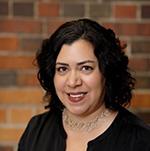DCLF Alumni Spotlight: Emily Bustos
Emily Bustos, CEO, Denver’s Early Childhood Council
Guest Contributor Aug 4, 2020
Emily Bustos, CEO, Denver’s Early Childhood Council, participated in the Denver Community Leadership Forum during the 2004 - 2005 cohort year.

Please share about your career path.
I’m a Denver native and for a time I was a neighborhood liaison for the city, in which federal and local dollars were being invested in Denver’s sixteen lowest-income neighborhoods. Then I worked through a place-based initiative of the Annie E. Casey Foundation focused on community development, called Making Connections-Denver. One of the initiative’s goals was developing school readiness so that children were entering school ready to succeed. This was where I was introduced to early childhood development.
Next, I began working with Denver’s Early Childhood Council when it was a city appointed group and not a nonprofit yet. I first came on as a consultant and once hired as the first Director worked on transitioning the organization to become a nonprofit organization. I’ve been at the organization for twelve years holding multiple positions and now serve as the CEO. This has been complementary for my own career evolution since I’ve been able to grow in one organization as a leader and gain skills on the job.
What made you decide to participate in the Denver Community Leadership Forum (DCLF)?
The program was recommended to me by Piton Foundation staff that had participated. At that time, I was the Deputy Director at Making Connections-Denver and still developing as a leader and working in the community. DCLF seemed like a good opportunity to develop professionally.
What still resonates with you from DCLF?
Being able to interact with emerging leaders from other sectors and hear their perspectives. DCLF is different than other programs in this way. We did monthly trainings, assessments, and Outward Bound, which were both physically and mentally challenging. I enjoyed being able to work through challenges together from different perspectives and see people more authentically, not just their work persona.
I’m still connected with my cohort members- we send out birthday reminders and had a meetup recently. I still feel like we can meet up with each other even though the program was fifteen years ago. We have this cross-sector network that wouldn’t exist if not for the program. I came away with a general understanding that diversifying your network is really important to your growth as a leader.
What advice do you have for future DCLF participants?
Everyone is so busy and it can be hard to commit the time, but really try to make the time and be engaged. It’s a change of pace from your day to day and time to focus on developing yourself.
This interview has been edited for clarity.

Please share about your career path.
I’m a Denver native and for a time I was a neighborhood liaison for the city, in which federal and local dollars were being invested in Denver’s sixteen lowest-income neighborhoods. Then I worked through a place-based initiative of the Annie E. Casey Foundation focused on community development, called Making Connections-Denver. One of the initiative’s goals was developing school readiness so that children were entering school ready to succeed. This was where I was introduced to early childhood development.
Next, I began working with Denver’s Early Childhood Council when it was a city appointed group and not a nonprofit yet. I first came on as a consultant and once hired as the first Director worked on transitioning the organization to become a nonprofit organization. I’ve been at the organization for twelve years holding multiple positions and now serve as the CEO. This has been complementary for my own career evolution since I’ve been able to grow in one organization as a leader and gain skills on the job.
The program was recommended to me by Piton Foundation staff that had participated. At that time, I was the Deputy Director at Making Connections-Denver and still developing as a leader and working in the community. DCLF seemed like a good opportunity to develop professionally.
What still resonates with you from DCLF?
Being able to interact with emerging leaders from other sectors and hear their perspectives. DCLF is different than other programs in this way. We did monthly trainings, assessments, and Outward Bound, which were both physically and mentally challenging. I enjoyed being able to work through challenges together from different perspectives and see people more authentically, not just their work persona.
I’m still connected with my cohort members- we send out birthday reminders and had a meetup recently. I still feel like we can meet up with each other even though the program was fifteen years ago. We have this cross-sector network that wouldn’t exist if not for the program. I came away with a general understanding that diversifying your network is really important to your growth as a leader.
What advice do you have for future DCLF participants?
Everyone is so busy and it can be hard to commit the time, but really try to make the time and be engaged. It’s a change of pace from your day to day and time to focus on developing yourself.
This interview has been edited for clarity.
Categories:
Colorado & Communities
Nonprofit Management & Leadership
School of Public Affairs
|
Tags:
DCLF
School of Public Affairs